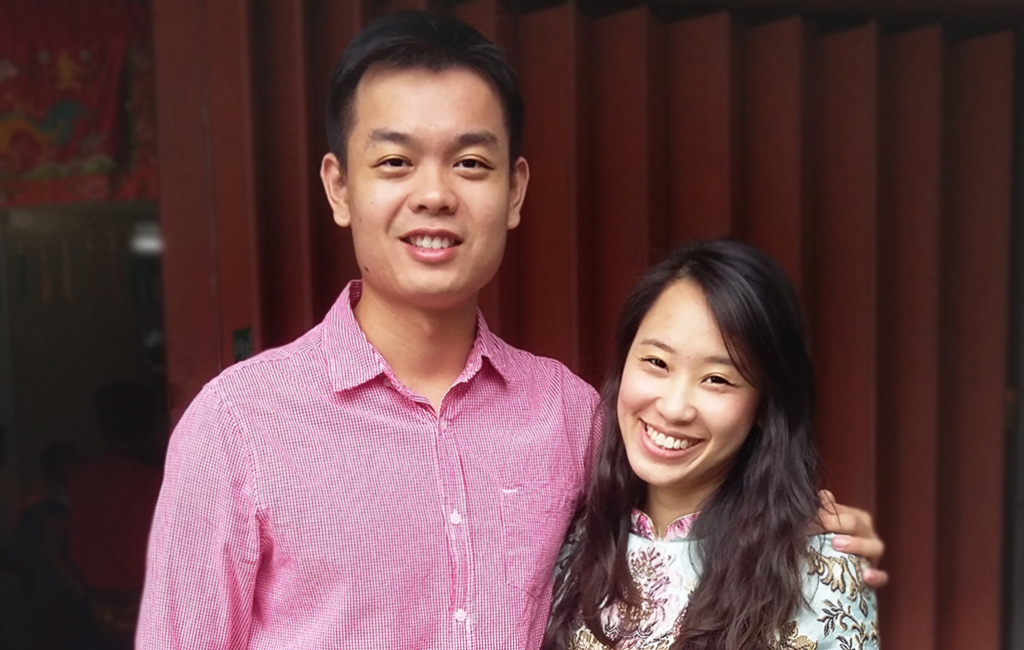
Married for just over a year now, Abel and Jacintha Cheah had made the decision to join Teach For Malaysia (TFM) while Jacintha was studying in the US and Abel in Monash University here in Malaysia.
Having stepped into a long distance relationship back in 2007 with the awareness that it was going to be very difficult, Abel and Jacintha decided to go ahead with it anyways trusting that if God was on the same page with them regarding their relationship, they will make it through.
They were both very active at their respective universities and ministries at church, and as they had conversations about their future together, they determined that they wanted to do something that would be of service to people, which would put them in a place where they could love people.
And so they both applied to join TFM, but then 2011 came around and things took an unexpected turn. Abel and Jacintha were very much looking forward to being reunited after 4 years and were eager to get started on their road toward marriage.

But as Abel was preparing for his final exams and graduation from Monash, he attended a prayer meeting at his church where he heard about a pastor who needed help to revive an 8-year-old church in Melaka.
“So I was sitting there and praying, ‘God can you send a man—send a man to help Ps. Tony because he needs help,’ and suddenly there was a kind of a pull in my heart,” Abel said, “and I felt a really strong sense of ‘Abel, you’re praying for a man, maybe you’re the man.’ And it was almost as if God was throwing the question back at me as I was asking Him to send a man.”
He left the prayer meeting that night with a very different heart and spirit. “I couldn’t sleep very well,” he said. He talked it over with Jacintha and his pastor, and “suffice to say, my journey toward a very different place in a very different trajectory from what we had planned, began,” he said.
Toward the second half of 2011, Abel left his family, his church, and even his chances of reuniting with Jacintha in a central location. “It as a very shocking and unexpected experience, but it was the start of an adventure with God.”

While Jacintha began her teaching career with TFM as planned, Abel had to decide whether or not to terminate his application since he knew that there was not going to be a placement in Melaka. He figured that he would have to get a job that will support his work with the church. He ended up going ahead with his application, trusting that God will provide a way.
Sure enough, Abel was accepted into TFM, and was placed to work in a school in Gemas, which is a small town at the border of Melaka, Negeri Sembilan, and Pahang. It was an hour away from his church in Bukit Beruang, and for two and a half years, he taught at this tiny school in Gemas during the week, and at the church in Melaka on the weekends.
On Sunday afternoons, Abel would drive from up from Melaka and Jacintha would drive down from Subang Jaya, and they would meet halfway in Seremban to spend the evening together. After dinner, they would drive home, away from each other and continue to talk on the phone, sharing in their teaching experiences, and encouraging one another.

Many of Abel’s students came from the lower income group, mainly from the agricultural demographic, and teaching in that environment proved to be very challenging. “On Monday to Friday, I would be teaching very difficult students who would sleep in the classroom and sometimes curse to my face, and then on Friday to Sunday, it was an uncannily similar environment at church.”
Abel entered into this journey thinking that the church and school experiences were going to be very different, but they turned out to be very similar because they were experiences with people. “They required me to connect with them, and required of me a form of giving and learning and constant refreshment from God. I realized that I always had to count on God’s strength or be completely exhausted.”
Even though the work he did in both places were difficult, Abel found joy in them. “I had a student who asked me for extra classes and would then walk 3km in the 5 o’clock sun to learn English grammar,” he shared, saying that he encountered many students like that who would give him lots of hope. They worked two jobs, were really invested, and genuinely wanted to learn.

At the same time, there were also students who would break his heart. Without any plans for their future, many of them only knew that they were headed to Kuala Lumpur after SPM, regardless of whether they passed or failed. “That’s the recipe for a generation without jobs, or very low paying jobs without any qualifications,” he said.
Disheartening as that was, God always reminded him of Philippians 2:13:
“… for it is God who works in you to will and to act in order to fulfill His good purpose.”
Today, Abel works within the management of TFM, in which he oversees and ensures the support of the teachers in their organization. “I grew up knowing the Jesus of miracles,” Abel said, “I knew the divine Jesus—the Jesus we worship. But as I went on in my journey, I started to discover the Jesus of social justice, and the Jesus who stands up for the oppressed—the Jesus who would stand in the gap and look out for the widows, the orphaned, and the sinners.”

“I discovered that my journey was not just a career that God told me to do and obey despite what my flesh says, but it was going to be a place where I grow in my passion, and I would eventually be able to say, this is where I belong. This is where I’ve found my calling, and this is where I know God wants me to be, and find joy and fulfillment and pride in it.” Abel said.
Meanwhile, Jacintha also had to think about her next path, as her two-year commitment with TFM came to a close. A Harvard graduate in East Asian Studies, many people found it interesting that she wanted to come back to Malaysia to join TFM and would ask, “You went to Harvard and you want to be a teacher?”
But Jacintha did not start out by wanting to become a teacher. Her interest was in helping people and giving back to society. “I felt like I had been given the privilege of having a world-class education,” she said, “and recalled my public school days when I felt like many things could be improved. So decided to come back and do Teach for Malaysia.”

While at TFM, Jacinta developed a love for teaching. “I really learned to love the skills of pedagogy and teaching and being in the classroom, while having that love of giving to people,” she said.
Being in some of the worst schools in the country, however, the idea of quality education sometimes seemed very remote and distant from reality. And so at the end of two years, Jacintha decided to work at Sunway International School, where she began to teach in a completely different environment.
“I thought that if I really wanted to be in the line of providing quality education, I would first need to have the skills and credibility,” she said. “I really wanted to be in a place where I can hone my teaching skills, but also develop a wider skill set so that I could generally understand education in a broader sense, not just from the teaching perspective, but from an all rounded perspective.”

Currently, Jacintha has a dual role at Sunway International School. She teaches 9th Grade Mathematics, but also does project management. “I’ve spent the last four years teaching, but now I’m also learning about education—private education, how to run a school, how to run projects in a school.”
“Sometimes, being in an international school feels like I’m in a different world,” Jacintha said. “I’m removed from what I actually wanted to do in the first place which was to give to the community and that can be tough.”
“But then I go back to what Tim Keller writes about in his book, Every Good Endeavour, and several these things he says resonate with me.”
How do we serve God in the workplace?
The way to serve God at work is to further social justice in the world.
The way to serve God at work is to be personally honest and evangelize your colleagues.
The way to serve God at work is just to do skillful, excellent work.
The way to serve God at work is to created beauty.
The way to serve God at work is to work from Christian motivation to glorify God, seeking to engage and influence culture to that end.
The way to serve God at work is to work with a grateful, joyful, gospel-changed heart through all the ups and downs.
The way to serve God at work is to do whatever gives you the greatest joy and passion.
The way to serve God at work is to make as much money as you can, so that you can be as generous as you can.
—Every Good Endeavour, Timothy Keller
“‘The way to serve God is just to do skillful, excellent work,’” Jacintha emphasized. “I recognize that in my line of work, I’m learning how to be conscientious, meticulous, competent, and skilled at what I do.
“‘The way to serve God at work is to do whatever gives you the greatest joy and passion.’ What I’m doing at work is teaching, and I love that. It’s one of my greatest joys and passions.
“‘The way to serve God at work is to create beauty.’ This one resonates with me most of all, because in the classroom, there are these micro-moments. Micro-moments are these small moments when you connect with the child, and the child somehow gets it after days and days of trying and then somehow, something clicks and the student gets it!

“These micro-moments are the ones that Abel and I, and anyone in the education line, wake up for every day. We wake up and we want to have these micro-moments, when for a moment, you feel like you created beauty.”
“It is possible to find yourself in a place where you’re not pushed into it because of a very hard-stance idea of God’s call,” Abel said, “but also a call that God nurtures you into over the years to get to where you’re supposed to be.”
|Share The Good News|
Esperanza Ng




I would like to serve God in Malaysia as a missionary volunteer and I need to know if you provide flight ticket and accommodation. As far as I am concerned, I am a christian book’s writer from Burundi and I like to reach unriched people, particularly where Christ is not known.
Thank you for your understanding and your time.